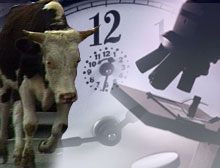
Scientists said yesterday (Friday) that they had successfully cloned a wild bull, but the calf died shortly after being born.
The wild bull from the Gaur breed is the world's first clone of an animal from a breed that is in danger of extinction. Although he died shortly after birth, the researchers said that the experience showed that cloning can perpetuate rare species, and even save particularly endangered animals from extinction.
The wild bull, who was named "Noah", was born on Monday night and died of bacterial infection two days later, but was healthy until then, said the researchers from the research team of the "Advanced Cell Technologies" company. In the short time that Noah lived, he was an energetic and friendly calf. Noah was cloned and adapted to living conditions by a surrogate mother from a more common breed of cattle, in this case a cow.
"The data collected clearly indicate that the cloning of hybrids works, and as a scientist, I am satisfied," said Philip Damiani, a researcher at the private company, in his statement to the media. "As a person, on the other hand, I am sad that an animal has died," he added.
The wild bulls of the Gaur Haim breed in Southeast Asia and India. Their color is brown and black and they have a hump. Being large and fleshy animals, weighing a ton or more, they were hunted until they became extinct.
Noah is a fit clone of a male bull that died eight years ago. His skin cells were then frozen. The team of researchers of the "advanced cell" took the cell nucleus from hundreds of skin cells and injected them into cow's eggs. The fertilization resulted in 40 embryos that were implanted in cows. Only one pregnancy was successful and ended in birth. The researchers reported that Noah was born weighing 36 kg.
"Noah died of clostridium enteritis - a bacterial infection that is recognized worldwide as fatal in newborn animals," said Dr. Robert Lanza, vice president of the company's research and medical department.
"Despite this obstacle, Noah's birth is a basis for hope. We still have a long way to go, but this technology is developing, and it has the potential to save dozens of extinct species", noted Dr. Lanza. The company hopes to clone another extinct species later this year - a mountain goat.
The "Advanced Cell Technologies" company was established with the aim of creating, through genetic engineering, a breed of cattle that would be able to produce human proteins in its milk. In 1998, a researcher at the company used cloning technology and inserted one of its cells into a cow's egg, and in fact cloned itself, but the embryo resulting from the fertilization died at a very early stage.
